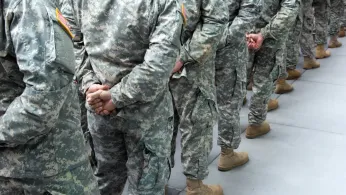
10 hours ago
Pentagon's New Grooming Memo Forces Transgender Troops Into an Impossible Choice
READ TIME: 4 MIN.
The U.S. Department of Defense has issued a new memo that reads like a punch to the gut for transgender service members who have fought—both literally and figuratively—for the right to serve their country authentically. The memo explicitly states that"waivers to permit civilian attire or a uniform not associated with a Service member's sex will not be authorized or considered," effectively mandating that transgender troops must present themselves according to their sex assigned at birth, not their gender identity.
For transgender people already navigating the minefield of military service, this represents yet another barrier designed to make their existence in uniform feel impossible. The policy doesn't just regulate appearance—it weaponizes it, turning something as fundamental as how you present yourself into a compliance issue that could determine whether you keep your job.
This isn't happening in a vacuum. The memo arrives amid a broader rollback of protections for LGBTQ+ service members, signaling a dramatic shift in military policy under the current administration. Where the Biden administration had moved toward greater inclusion and recognition of transgender troops' right to serve authentically, the new guidance suggests a return to an era when being visibly queer in uniform was treated as a threat to"military readiness"—a phrase that has historically been code for"we're uncomfortable with your existence."
What's particularly striking about this memo is its timing and its absolutism. There's no middle ground, no recognition of the lived reality that transgender people have been serving in the U.S. military with distinction for decades. Instead, the language suggests that transgender identity itself is incompatible with military service.
The White House guidance accompanying these policies goes even further, stating that"expressing a false'gender identity' divergent from an individual's sex cannot satisfy the rigorous standards necessary for military service," and that"a man's assertion that he is a woman, and his requirement that others honor this falsehood, is not consistent with the humility and selflessness required of a service member."
This language is dehumanizing. It frames transgender identity not as a legitimate aspect of human diversity, but as dishonesty—a"falsehood" that somehow undermines military values. For transgender service members who have already endured scrutiny, discrimination, and the constant burden of proving their worth, these words sting with a particular cruelty.
Let's be clear about what this policy actually does to real people. A transgender woman in the military would be required to wear a uniform cut for men's bodies, use grooming standards designed for men, and present in ways that directly contradict her identity. A transgender man would face similar erasure. The memo offers no flexibility, no recognition that forcing people to present in ways that conflict with their gender identity can cause genuine psychological harm.
For many transgender people, the ability to present authentically isn't a luxury or a preference—it's essential to their mental health and well-being. The military's own research has shown that supporting transgender service members' authentic self-expression improves retention, morale, and unit cohesion. Yet this memo moves in the opposite direction entirely.
The Department of Defense has also indicated that service members with gender dysphoria are now considered incompatible with military service and must be processed for separation unless they obtain a waiver. This creates a Catch-22: transgender service members are told they can serve, but only if they hide who they are, and if they've been diagnosed with gender dysphoria—a medical condition that many transgender people experience—they're essentially being pushed out the door.
This memo doesn't exist in isolation. It's part of a coordinated effort to restrict the rights and visibility of LGBTQ+ people across multiple fronts. When the military—an institution that shapes national culture and values—sends the message that transgender people don't belong, it reverberates far beyond the barracks. It tells society at large that transgender identity is something to be hidden, managed, and ultimately eliminated.
For young transgender people considering military service as a path to education, economic stability, or the honor of serving their country, this policy is a devastating message: you're not welcome here, not really. You can serve, but only if you erase yourself.
Legal advocates and LGBTQ+ organizations have pushed back forcefully. Shannon Minter, an attorney working on these issues, told The Advocate:"This administration is desperate to distract from the reality that these service members have impeccable records and that there is no reason whatsoever to separate them from military service."
Minter's statement cuts to the heart of the matter. The policy isn't based on evidence or performance metrics. Transgender service members have proven themselves capable, dedicated, and worthy of the uniform. The restrictions being imposed now are purely ideological—a reassertion of traditional hierarchies and an attempt to make LGBTQ+ people feel unwelcome in spaces they've earned the right to occupy.
For transgender service members currently serving, this memo creates an impossible situation. Do they comply and suppress their identity? Do they resist and risk their careers? Do they leave voluntarily rather than endure the psychological toll of constant erasure?
The memo also raises questions about enforcement. How will the military police how transgender people dress off-duty? Will service members face discipline for appearing in public in ways consistent with their gender identity? The guidance is silent on these practical questions, leaving commanders without clear direction and service members in legal limbo.
What's clear is that this moment represents a critical juncture for LGBTQ+ rights in America. The military has historically been a bellwether for broader social policy. When the Pentagon restricts transgender people's rights, it sends a signal that reverberates through federal agencies, state governments, and private employers.
For the queer community, this memo is a reminder of how fragile progress can be. Rights that seemed secure just months ago are being rolled back at alarming speed. Transgender service members need support—from legal advocates, from LGBTQ+ organizations, and from allies who understand that this fight is about far more than uniforms and grooming standards. It's about dignity, inclusion, and the fundamental right to exist authentically.
The fight for transgender military service is far from over. But moments like this clarify what's at stake: the right of transgender people to serve their country without being forced to deny who they are.






